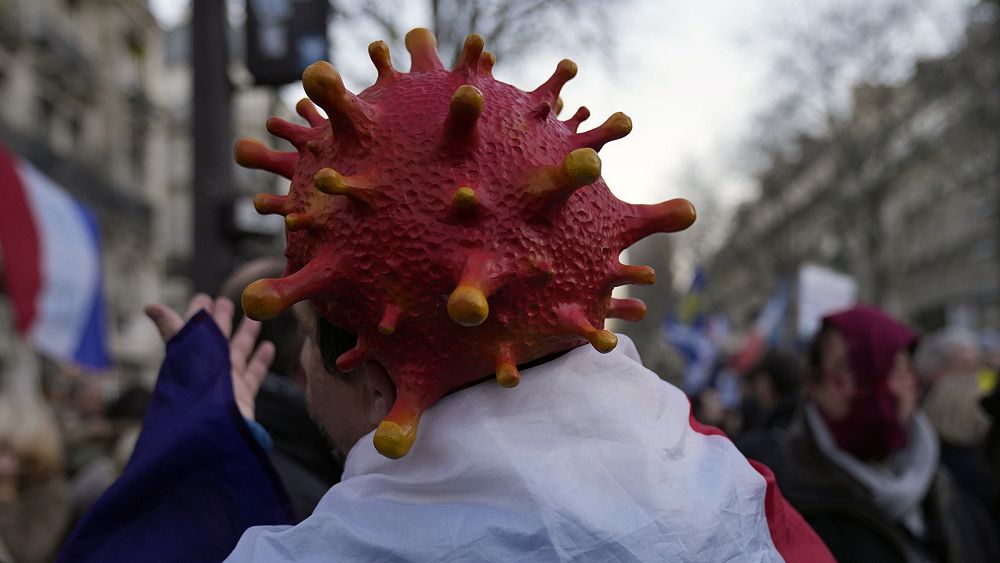
Thousands of protesters rallied across Europe this weekend, as nations were moving to impose tougher measures to stem a new wave of COVID-19 infections spurred by the highly transmissible Omicron variant.
On Sunday, it was Brussels, where the marchers, some with placards reading “free zone,” “I’ve had my fair dose” and “enough is enough,” came to protest the government’s strong advice to get vaccinated.
The crowd gathered included Belgian health care workers who will have a three-month window in which to get vaccinated against the coronavirus from January 1 or risk losing their jobs.
A strong police presence was deployed on the streets in anticipation of the protest, given how previous demonstrations had descended into violence, arrest, and injury.
In a Brussels demonstration last month, small fringes spiraled into violence as several hundred people started pelting police, smashing cars, and setting garbage bins ablaze. Police responded with tear gas and water cannons.
What started out as peaceful protests again erupted in violence, with all too familiar scenes of clouds of smoke and demonstrators arrested repeating once more.
On Saturday, protesters marched in the streets of Paris and other cities throughout France to protest new government restrictions.
A larger-than-usual crowd had people chanting against the vaccine pass that the government was planning, with some carrying signs with freedom slogans or comparing the measures to a “dictatorship”.
The French government proposed requiring proof of vaccination for those entering restaurants, cafes, and other public establishments.
Also, vaccination of children ages 5 through 11 begins on Wednesday – another gripe the protesters voiced during the march.
Nearly 3,000 people are in intensive care with COVID-19 in France.
Confrontations and claims of ‘dictatorship’
In London, another demonstration on Saturday resulted in clashes between police and protesters.
Critics of British prime minister Boris Johnson’s latest coronavirus restrictions flooded Oxford Street, a popular London shopping area, blocking traffic as they marched with signs bearing slogans such as “Vaccine passports kill our freedoms” and “Don’t comply.”
Other signs had the faces of Johnson or UK health secretary Sajid Javid and read, “Give them the boot.”
Police faced off with demonstrators both at Parliament Square and then later outside Downing Street, the official residence of the prime minister.
The clashes came as Omicron was confirmed as the dominant variant in London, prompting the city’s mayor to declare a “major incident”.
Sadiq Khan underscored the official concern about the climbing cases and their potential to overwhelm the health care system by declaring a major incident, a move that allows local councils in Britain’s capital to coordinate work more closely with emergency services.
On the same night, demonstrations erupted in Barcelona against the recent introduction of COVID passports to access public spaces in the Catalan region.
The protest was taking place for the third week in a row, with organisers saying they will continue as long as current restrictions remain in place.
A 38-year-old hotel worker, Richard, said that the mandatory COVID pass and other regulations were akin to “a dictatorship at this point,” claiming it “reminds (him) of Nazism.”
Protesters also gathered in Turin, the Hague, and Vienna, among other places.
Far-right exploits people’s fears
What stood out in all of these protests — but also others that have been taking place throughout the continent almost since the beginning of the pandemic — is the sometimes very vocal presence of conspiracy theorists interspersed with members of far-right groups, who seem to be capitalising on people’s sense of insecurity and anger at the government in trying times.
“COVID-19 has served as a catalyst for radicalisation,” said Ciaran O’Connor, an analyst at the London-based Institute for Strategic Dialogue.
“It allows conspiracy theorists or extremists to create simple narratives, framing it as us versus them, good versus evil.”
Comparisons to the World War II regime of Nazi Germany are becoming all too common, for example.
Yellow Stars-of-David — drawing a parallel between today’s anti-vaxxers and the Holocaust — have sprung up everywhere, from Switzerland to Croatia.
Banners conflating swastikas and vaccine injections could be seen at demonstrations in places like Spain and the Netherlands.
The same crowds can also feature people claiming that the pandemic is a “Jewish conspiracy.”
Threats of violence against women, people of colour and the LGBTI population have also become more prevalent, experts say.
Conspiracy theories can provide an artificial sense of control, said Cynthia Miller-Idriss, director of the Polarization and Extremism Research and Innovation Lab at American University, which studies far-right extremism.
Various grievances and racial and ethnic hatred were only exacerbated by COVID-19, which deepened the anger.
“COVID-19 has created fertile ground for recruitment because so many people around the world feel unsettled,” Miller-Idriss stated.